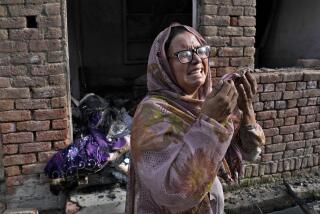Sadr lashes out at Americans
- Share via
BAGHDAD — Radical Shiite Muslim cleric Muqtada Sadr, in fiery rhetoric echoed Friday in some other Shiite mosques across Iraq, blamed America’s continued presence for bombings a day earlier that killed more than 130 people in mainly Shiite areas of Baghdad and a troubled province to the north.
The U.S. military, meanwhile, said it had captured a man described as a key figure in the roadside bombings that have taken a heavy toll on American troops.
The raid took place in Sadr City, a vast, largely Shiite slum that is a longtime militia stronghold. The suspect was not named, but U.S. officials have blamed Shiite militias backed by Iran for importing and planting sophisticated, armor-piercing devices that have killed scores of U.S. troops.
Sadr City and other Shiite neighborhoods in Baghdad rang with cries of mourning Friday over Thursday’s bombings in the capital’s northeast Shaab district and in the mainly Shiite town of Khalis, in Diyala province north of the city. Diyala has seen recurrent fighting between insurgents and American troops, as well as between Sunni Arabs and Shiites.
Dual suicide attacks in Shaab killed about 80 people and injured more than 100, leaving a trail of carnage in a crowded maze of shopping stalls. Nearby, Sadr City’s main hospital remained packed with the wounded, many of them women and children. The Khalis blasts, also in a marketplace, killed about 50 people.
The U.S. military Friday reported the death of a soldier a day earlier in a roadside bombing in south Baghdad, in which a second service member was wounded. Since the war in Iraq began just over four years ago, 3,245 American military personnel have been killed, according to the website icasualties.org, which tracks military deaths .
For six weeks, U.S. and Iraqi forces have been carrying out a broad security sweep aimed at quelling violence in the capital. During that time, bombings and other attacks have increased in other cities and towns.
In one such attack Tuesday, a massive bombing in the northern town of Tall Afar killed about 85 people, most of them Shiites. That assault triggered a round of sectarian reprisal killings that left dozens of Sunni men dead, many of them slain execution-style.
Authorities arrested 18 Shiite police officers as suspects in the reprisal killings but then released them, apparently in a bid to stave off violent protests by Shiites. Local authorities said Friday that the 18 had been arrested again, a development that may reflect a power struggle over whether those believed responsible should be brought to justice.
Army Gen. David H. Petraeus, the U.S. commander in Iraq, blamed the “barbaric” attacks in Tall Afar and elsewhere on the group Al Qaeda in Iraq, saying it and allied Sunni Arab insurgent groups showed a “complete rejection of respect for life itself.”
Shiite cleric Sadr, in remarks read at a mosque in the southern city of Kufa and in Baghdad’s Sadr City, blamed the American presence for the recent increase in civilian deaths. He denounced the United States as “the greatest of evils” and demanded that American troops leave the country.
“Oppressed people of Iraq, voice your rejection to this occupation to the whole world,” said the sermon, read by followers. In Sadr City, worshipers chanted in response, “No, no to America! No, no to occupation!”
Sadr, whose whereabouts are not known, called for huge demonstrations to be held April 9, the anniversary of the fall of Baghdad in the 2003 U.S.-led invasion. Sadr’s Al Mahdi militia battled American forces during 2004 but has remained largely quiet during the current crackdown.
Meanwhile, the U.S. military said it was investigating reports that U.S. airstrikes on a suspected Shiite militia base on the eastern edge of Baghdad had killed 27 people and wounded 14. Local officials said most of the dead were believed to be militants.
In the northern city of Mosul, authorities said about two dozen bodies, most with gunshot wounds, had been discovered at various sites. Morgue workers were trying to identify the victims.
Thirteen bullet-riddled bodies, all with bound hands, were found in Baghdad.
Times staff writers Said Rifai, Raheem Salman and Zeena Kareem in Baghdad contributed to this report.
More to Read
Sign up for Essential California
The most important California stories and recommendations in your inbox every morning.
You may occasionally receive promotional content from the Los Angeles Times.












